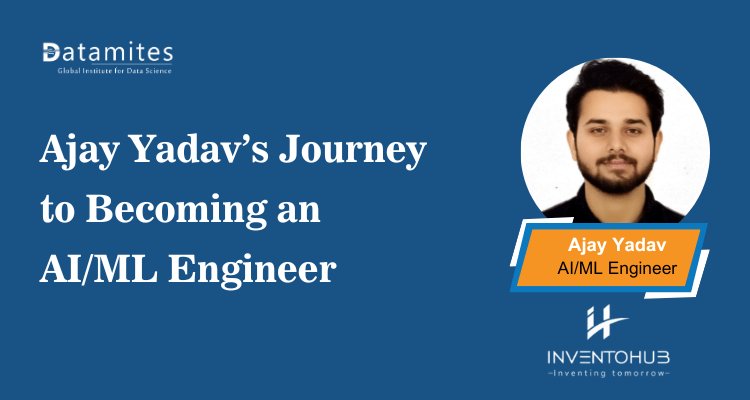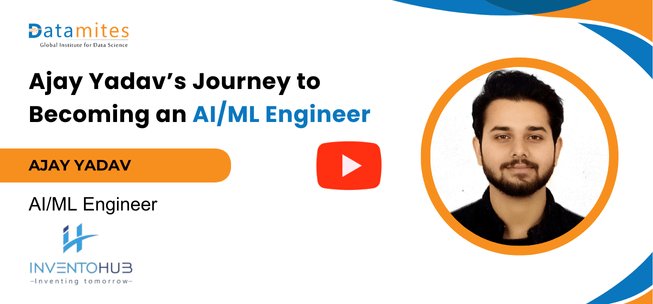From Electronics to AI/ML: Ajay Yadav’s Path to Success
Discover Ajay Yadav’s inspiring journey from electronics to AI/ML, as he shares his career path, challenges, and key insights for aspiring artificial intelligence and machine learning professionals.

Switching careers is never easy, especially when it means moving from a traditional field like electronics to one of the most dynamic and fast-growing domains of our time Artificial Intelligence and Machine Learning. Yet, Ajay Yadav’s journey proves that with determination, the right guidance, and a passion for innovation, anything is possible. His story isn’t just about mastering complex algorithms; it’s about embracing change, overcoming challenges, and unlocking opportunities in the AI/ML landscape. If you’ve ever wondered how someone can transform their career and thrive in the digital age, Ajay’s path to success is sure to inspire you.
Ajay Yadav Shares His Journey: Key Insights for AI/ML Aspirants
Ajay Yadav’s journey into Artificial Intelligence and Machine Learning is filled with challenges, learning, and growth. He shares valuable insights and advice that every AI/ML aspirant can learn from.
Q1: Can you introduce yourself and tell us about your background?
My name is Ajay Yadav. I’m from Bhopal, Madhya Pradesh, where I completed my graduation in Electronics and Communication Engineering in 2023. After graduation, I wanted to build a career in data science, so I joined DataMites and pursued certification courses to strengthen my knowledge of machine learning. Alongside, I am also pursuing my M.Tech in Data Science and Machine Learning.
Q2: What motivated you to shift from electronics to data science?
During my graduation, I recognized that the future lies in data-driven technologies. I wanted to pursue a career in a field where innovation never stops. That’s when I decided to step into data science, marking the beginning of my transition into this exciting domain.
Q3: How did you start with Python programming?
Initially, I wasn’t very strong in Python. But I knew it was essential for data science, so I started focusing on it. Surprisingly, Python isn’t that difficult. Anyone can learn it with consistent practice. To master it, I practiced small programs daily. My learning mantra was simple: even if I studied for only half an hour, I made sure I didn’t skip days. Consistency mattered more than long study hours.
Q4: Statistics plays a key role in data science. How was your experience learning it?
Yes, statistics is very important for data analytics. It helps you understand datasets, patterns, and algorithms at a deeper level. After Python, statistics was the most used skill in my journey. Once I got comfortable with it, I was able to understand machine learning concepts much better.
Q5: How did you practice machine learning projects?
Once I learned Python and statistics, I started working on projects using real datasets. I spent a lot of time practicing on Kaggle. Exploring multiple datasets gave me practical exposure to cleaning data, analyzing it, and applying machine learning models. Although I haven’t participated in Kaggle competitions yet, I plan to take part in them in the future.
Q6: Can you tell us about the projects you worked on during your training?
I worked on a total of five main projects during my course:
- Regression: House price prediction
- Classification: Blood donation prediction
- Clustering: FIFA 20 World Cup dataset analysis
- Convolutional Neural Network (CNN): Rice leaf disease detection using images
- Client Project: A practical project assigned by the training center
Each project helped me strengthen different aspects of machine learning, from predictive modeling to image processing.
Q7: How important are projects when appearing for interviews?
Projects are extremely important. They show your practical knowledge and problem-solving ability. During interviews, companies often ask about the techniques you used, the challenges you faced, and how you achieved better accuracy. Deep knowledge of your projects can make a big difference in how confidently you present yourself.
Q8: How much time did you spend on each project?
On average, it took 12–14 days per project, with a few hours dedicated every day. I worked in a team of five, and we divided roles according to our strengths. Team collaboration helped us complete projects efficiently.
Q9: What was your interview experience like?
I began applying for jobs in September 2024. My journey included three interviews, and I learned from each one. At first, I was very choosy about job locations, which limited my opportunities. Later, I realized flexibility is important in the job hunt.
Q10: How did soft skills help you in cracking interviews?
Technical knowledge is important, but communication skills matter a lot. At DataMites, I attended several soft skill sessions, which helped me improve my confidence during interviews. This definitely gave me an edge.
Q11: What is your role in your new job?
My role involves end-to-end data handling. I’m responsible for extracting data from different websites, cleaning it, visualizing it, and finding insights. Based on the project requirements, I also select suitable machine learning models to make predictions or support decision-making.
Q12: What advice would you give aspiring data science professionals?
- Be consistent in your practice, even if it’s just for 30 minutes daily.
- Don’t fear Python or statistics; they’re easier to learn with practice.
- Work on real datasets to understand practical applications.
- Improving your communication and soft skills they’re as important as technical knowledge.
- Stay flexible with opportunities, especially at the start of your Artificial Intelligence career.
Refer these below articles:
- Praveen’s Transformation: Student to AI & Machine Learning Engineer
- From Mechanical Engineer to AI Engineer: An Inspiring Journey of Divyansh
- Mughendhar’s Journey from Mechanical Engineering to AI Professional
Key Findings from Ajay Yadav’s AI/ML journey
Educational Background
- Ajay Yadav is from Bhopal, completed his B.Tech in Electronics & Communication (2023).
- Pursuing M.Tech in Data Science and Machine Learning while completing certifications from DataMites.
Motivation for Transition
- Shifted from electronics to data science after realizing the future lies in data-driven technologies and continuous innovation.
Python Learning Journey
- Initially weak in Python but improved through consistent daily practice.
- Believes consistency is more important than long study hours.
Statistics Learning
- Found statistics essential for understanding datasets, algorithms, and ML concepts.
- Second most used skill after Python.
Hands-On Experience
- Practiced extensively on Kaggle with real datasets.
- Gained practical exposure in data cleaning, analysis, and ML/AI model application.
Read these below articles:
- Generative AI and Predictive AI: Key Differences Explained
- Why Artificial Intelligence Matters More Than Ever
- How to Choose the Best Institute for AI/ML in Mumbai?
Ajay Yadav’s journey is proof that dedication, consistent learning, and adaptability can help anyone transition into data science, regardless of their academic background. From learning Python and statistics to landing his first role in machine learning, his story is a source of motivation for aspiring data scientists. According to ABI Research, the global Artificial Intelligence (AI) software market was valued at USD 122 billion in 2024 and is projected to grow at a CAGR of 25%, reaching USD 467 billion by 2030.
Pune has rapidly grown into one of India’s leading technology hubs, making significant progress in Artificial Intelligence (AI) and Machine Learning (ML). With its robust educational ecosystem, presence of global IT firms, and a dynamic startup culture, Artificial Intelligence courses in Pune are playing a pivotal role in driving industry-wide adoption of these transformative technologies.
DataMites Artificial Intelligence Institute in Chennai is dedicated to preparing learners for successful careers in AI. To cater to different learning needs, Datamites institute has multiple training options, classroom sessions at centers in Anna Nagar, Guindy, and Perungudi, interactive live online classes for remote participants, and self-paced recorded modules for those who prefer flexible learning.

